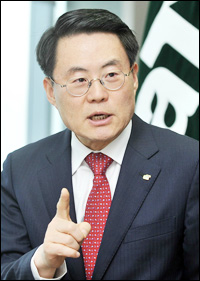Important milestone
Korea aims to reach $10 bil. in food exports
After reaching the $10 billion plateau in exports in the late 1970s, Korea has chalked up fast growth in overseas shipments to become the world’s ninth country to top $1 trillion in trade last year.
Korea Agro-Fisheries & Food Trade Corp. CEO Kim Jae-soo expects the same things could happen in food and fisheries this year.
“We aim to achieve the $10 billion mark this year, substantially up from last year’s $7.7 billion. It is a tall task but we will double our efforts to attain the goal,’’ Kim said in a recent interview with The Korea Times.
“The $10 billion is kind of a threshold _ it’s hard to overcome but promises a fruitful future after that point. Once the country surpasses the tough milestone, I think that the exports of food and fisheries will explode.’’
The 55-year-old said that a paradigm shift will take place soon in production, distribution and consumption in the food industry so as to change the mindset of farmers.
“If our agricultural exports jump over the $10 billion level, our farmers will start regarding overseas markets as one of their significant revenue sources,’’ said Kim who took the helm late last year.
To spearhead the country to get beyond the $10 billion line, Kim vowed to reorganize the corporation by breathing entrepreneurship into the state-run entity.
“I have taken charge of a few state-backed organizations in my career and learned how to deal with them, as they are typically resistant to changes and are not ready to take risks,’’ he said.
“To change public organizations, one of the best ways is to breathe a sense of urgency into them. I will do that.’’
During his three decades-plus career, Kim has taken the reins of three other public entities _ the Rural Development Administration, the Training Institute for Food, Agriculture and Fisheries and the National Agricultural Products Quality Management Service.
Asked about a free trade agreement (FTA) with China, negotiations for which started this week, the life-time bureaucrat said that we do not have to panic over the bilateral deal.
Worries have risen that the FTA might wreak havoc on Korea’s agricultural sector because fresh items, not frozen ones, can easily be imported due to the geographical proximity of the two countries.
In consideration of the price competitiveness of Chinese farm and fishery items, the elimination of tariff barriers is feared to damage the businesses of Korean farmers, ranchers and fishermen.
“If an industry is destined to collapse due to the FTA, it will face the same fate over the long haul even without the agreement,’’ Kim said. “We need to nurture competitiveness in our farm industries.’’
“As our manufacturers racked up success in competition with global giants, our farm businesses can do that. Finding fresh opportunities for farm products or seeking an export-oriented production system can be the way.’’
Kim also stressed that Asia’s fourth-largest economy is required to increase its self-sufficiency ratio to somewhere between 30 percent and 40 percent for food security.
Currently, the country depends heavily on imports for most major grains such as wheat, barley and beans with the sole exception of its main staple, rice.
“Have a look at the advanced countries of the G8 including the United States, the United Kingdom, France, Canada and Germany. They are all agricultural powerhouses,’’ he said.
“In a system where 90 percent of major grains are imported, no country can join the rank of advanced nations.’’
Kim, with a Ph.D. in economics, joined the government in the late 1970s to assume a set of important roles at the farm ministry. He was a deputy minister for food, agriculture, forestry and fisheries between 2010 and 2011. <Korea Times/Kim Tae-gyu>

























































